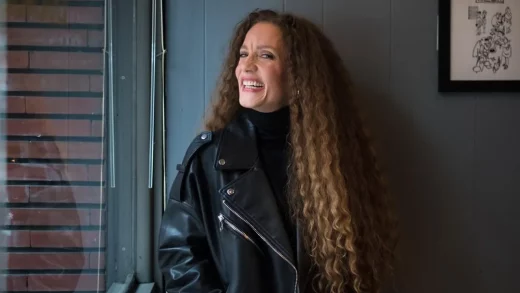
Tom Lee/Stuff
Puutikitiki used to be a home for the elderly but will now accommodate men just released from prison or on remand. Pictured from left are staff members involved: Nadine Hapuku, John Pirika, Jaimee-Lee Walker, Lady Tureiti Moxon, Gail Poihipi and Jonas Hapuku.
As solid carved pou look out, a sign post decorated with kōwhaiwhai (patterns) welcomes people in.
This is the newly opened Puutikitiki facility in Hamilton East, converted from aged care to a place for second chances for men in the justice system.
And, just like at the wharenui of a marae, shoes are removed as you enter the door.
It’s about “a place to stay while they find their feet”, said Lady Tureiti Moxon, managing director at Te Kōhao Health.
READ MORE:
* ‘A big deal’ as Te Kōhao Health takes two giant strides on supporting Māori wellbeing
* Free X-rays, fast diagnoses the aim of Māori health provider’s $15m plans
* Fifteen years – and counting – of fighting for Māori healthcare for Tureiti Lady Moxon
MONIQUE FORD / STUFF
Progress has been made in safely reducing the prison population, but there is more work to do.
Puutikitiki is a kaupapa Māori complex available to men released from prison and medium to low-risk male offenders on remand.
“There are an exorbitant number of people who are in prison who don’t need to be there. They are either on remand or bail, but they’ve got nowhere to live, so we decided that we would use it for people that were actually in need,” Moxon said.
It has 24 rooms, four bathrooms, a kitchen, dining room and activity areas. People can stay for up to 18 months and there’s 24-hour on site support, and assistance in areas from health and well-being to employment and driver licensing.
Tom Lee/Stuff
“I want it to be more than just a facility to lay your head down,” said Te Kōhao Health managing director Lady Tureiti Moxon.
Two years ago, Te Kōhao Health began the process to purchase and refurbish the site in partnership with the Department of Corrections.
It took around $1 million to set up the facility Moxon said, including $600,000 to purchase the property.
About 15,000 people are released from prison each year, Corrections Waikato district manager Rowan Balloch said.
Tom Lee/Stuff
A communal lounge is part of Puutikitiki’s multi-use space.
Corrections is committed to reintegrating people, Balloch said, and finding suitable accommodation is one of the most significant problems.
The Te Kōhao Health partnership would help people subject to a community-based sentence or order in the Waikato, Balloch said.
And the Von Tempsky Street building has been given the historic Māori name from the area of Hamilton where it sits.
Tom Lee/Stuff
There are 24 bedrooms in the facility and 24-hour support available.
Being marae-based is important, Moxon said, because many people in prison have lost connection with family or never known family.
The project also aligns with Corrections’ Hōkai Rangi strategy to reduce the prison population. About 49% of people previously convicted are re-imprisoned in that time, and rates are higher for Māori.
Public reception to the facility had been reasonably positive, Moxon said, but she wasn’t fazed by possible negative feedback.
Moxon had high hopes for the first tranche of attendees.
“I want it to be more than just a facility to lay your head down … a home away from home and a place where they can feel like they are a part of it.”
Tom Lee/Stuff
Attendees will be able to stay for up to 18 months, Corrections says. Pictured the computer and music suite.


